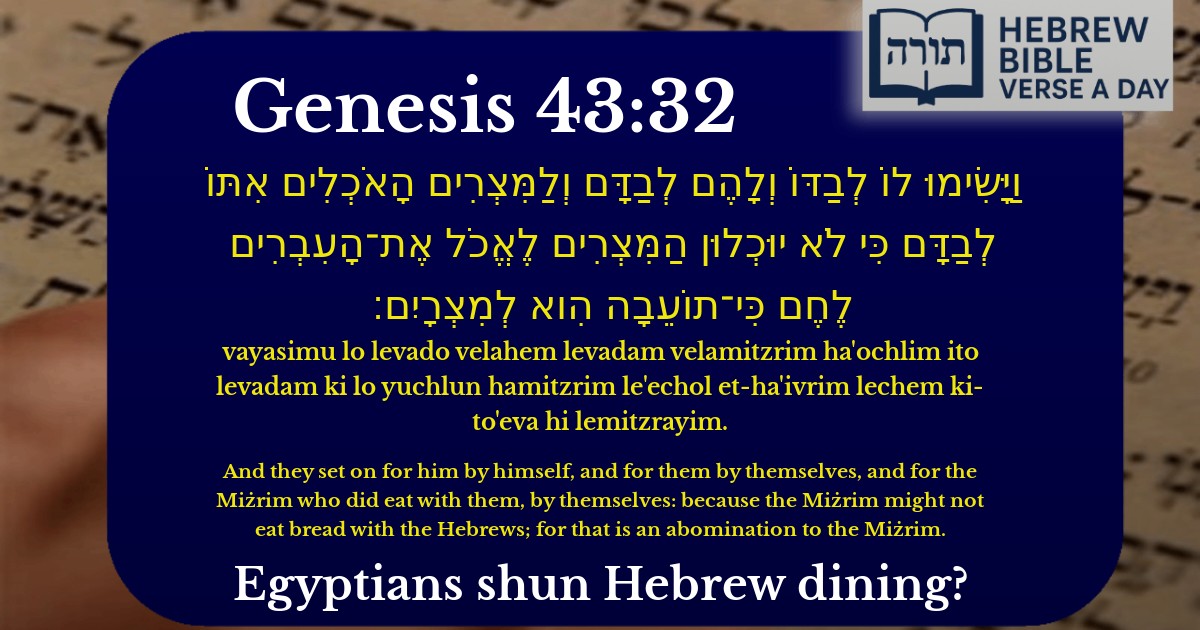Join Our Newsletter To Be Informed When New Videos Are Posted
Join the thousands of fellow Studends who rely on our videos to learn how to read the bible in Hebrew for free!
Hebrew Text
וַיָּשִׂימוּ לוֹ לְבַדּוֹ וְלָהֶם לְבַדָּם וְלַמִּצְרִים הָאֹכְלִים אִתּוֹ לְבַדָּם כִּי לֹא יוּכְלוּן הַמִּצְרִים לֶאֱכֹל אֶת־הָעִבְרִים לֶחֶם כִּי־תוֹעֵבָה הִוא לְמִצְרָיִם׃
English Translation
And they set on for him by himself, and for them by themselves, and for the Miżrim who did eat with them, by themselves: because the Miżrim might not eat bread with the Hebrews; for that is an abomination to the Miżrim.
Transliteration
Vayasimu lo levado velahem levadam velamitzrim ha'ochlim ito levadam ki lo yuchlun hamitzrim le'echol et-ha'ivrim lechem ki-to'eva hi lemitzrayim.
Hebrew Leining Text
וַיָּשִׂ֥ימוּ ל֛וֹ לְבַדּ֖וֹ וְלָהֶ֣ם לְבַדָּ֑ם וְלַמִּצְרִ֞ים הָאֹכְלִ֤ים אִתּוֹ֙ לְבַדָּ֔ם כִּי֩ לֹ֨א יוּכְל֜וּן הַמִּצְרִ֗ים לֶאֱכֹ֤ל אֶת־הָֽעִבְרִים֙ לֶ֔חֶם כִּי־תוֹעֵבָ֥ה הִ֖וא לְמִצְרָֽיִם׃
וַיָּשִׂ֥ימוּ ל֛וֹ לְבַדּ֖וֹ וְלָהֶ֣ם לְבַדָּ֑ם וְלַמִּצְרִ֞ים הָאֹכְלִ֤ים אִתּוֹ֙ לְבַדָּ֔ם כִּי֩ לֹ֨א יוּכְל֜וּן הַמִּצְרִ֗ים לֶאֱכֹ֤ל אֶת־הָֽעִבְרִים֙ לֶ֔חֶם כִּי־תוֹעֵבָ֥ה הִ֖וא לְמִצְרָֽיִם׃
🎵 Listen to leining
Parasha Commentary
📚 Talmud Citations
This verse is not quoted in the Talmud.


Context of the Verse
This verse (Bereshit 43:32) describes the scene where Yosef, now viceroy of Mitzrayim, hosts his brothers for a meal. The Torah emphasizes the separation in seating arrangements: Yosef ate alone, the brothers ate separately, and the Mitzrim (Egyptians) who dined with them also ate separately. The reason given is that the Mitzrim could not eat bread with the Hebrews, as it was considered an abomination to them.
Rashi's Explanation
Rashi (Rabbi Shlomo Yitzchaki) comments that the Mitzrim found it repulsive to eat with the Hebrews because the Hebrews ate animals that the Mitzrim worshipped as deities. The Mitzrim revered sheep (as seen later during the Exodus, when they protested Bnei Yisrael taking their flocks). Since the Hebrews shepherded and consumed these animals, the Mitzrim considered sharing a meal with them to be a to'eivah (abomination).
Rambam's Perspective
Rambam (Maimonides) in Moreh Nevuchim (3:46) explains that this separation reflects the Mitzrim's idolatrous practices. Their aversion to eating with the Hebrews stemmed from their religious beliefs, which prohibited associating with those who did not share their worship of certain animals. This cultural and religious divide was deeply ingrained in Egyptian society.
Midrashic Insights
Halachic and Ethical Implications
The Sefer HaChinuch (Mitzvah 116) connects this episode to the broader Torah prohibition against adopting the practices of idolaters. The Mitzrim's customs were rooted in avodah zarah (idolatry), and the Torah later commands Bnei Yisrael to distance themselves from such behaviors. This verse highlights the importance of maintaining Jewish distinctiveness, even in mundane activities like eating.
Symbolism of Separation
The Kli Yakar (Rabbi Shlomo Ephraim Luntschitz) notes that this separation foreshadows the eventual enslavement of Bnei Yisrael in Mitzrayim. The Mitzrim's disdain for the Hebrews laid the groundwork for their later oppression, demonstrating how hatred rooted in cultural differences can escalate into persecution.